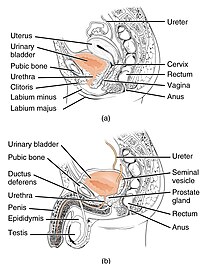
Photo from wikipedia
OBJECTIVE Catheter-related bladder discomfort (CRBD) is a common complication of intraoperative urinary catheterization. Various studies have evaluated the efficacy of different interventions in postoperative CRBD. The present review was performed… Click to show full abstract
OBJECTIVE Catheter-related bladder discomfort (CRBD) is a common complication of intraoperative urinary catheterization. Various studies have evaluated the efficacy of different interventions in postoperative CRBD. The present review was performed to assess the efficacy of these interventions. METHODS PubMed, Embase, and CENTRAL (Cochrane Central Register of Controlled Trials) databases were systematically searched to identify randomized controlled trials (RCTs) investigating the efficacy of different drugs for the prevention of postoperative CRBD. This review evaluated the incidence and severity of CRBD after different interventions at 0, 1, 2, and 6 h postoperatively. RESULTS Forty-five studies including 31 different drugs were analyzed. Eleven drugs were investigated in more than two RCTs, of which dexmedetomidine, gabapentin, tolterodine, tramadol, ketamine, nefopam, oxybutynin, pregabalin, and pudendal nerve block (PNB) generally showed significantly higher efficacy than controls postoperatively. Solifenacin only showed significant efficacy compared with the control at 0 h, and intravenous lidocaine only showed significant efficacy compared with the control at 6 h. There were insufficient trials to draw conclusions regarding atropine, butylscopolamine, chlorpheniramine, clonidine, darifenacin, diphenhydramine, glycopyrrolate, intravesical bupivacaine, ketamine-haloperidol, pethidine-haloperidol, ketorolac, lidocaine-prilocaine cream, magnesium, hyoscine n-butyl bromide, oxycodone, paracetamol, parecoxib, trospium, resiniferatoxin, or amikacin. However, all but pethidine-haloperidol and chlorpheniramine showed some efficacy at various time points compared with controls. CONCLUSION This review suggests that dexmedetomidine, gabapentin, tolterodine, tramadol, ketamine, nefopam, oxybutynin, pregabalin, and PNB are effective in preventing postoperative CRBD. Considering the efficacy and adverse effects of all drugs, dexmedetomidine and gabapentin were ranked best.
Journal Title: European journal of clinical pharmacology
Year Published: 2022
Link to full text (if available)
Share on Social Media: Sign Up to like & get
recommendations!